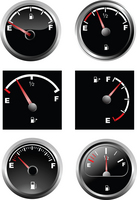 You probably use your credit card quite often, perhaps even multiple times each day. We’ve become accustomed to using our credit cards to buy groceries, gasoline, and even to buy fast food through the drive through window. For many individuals, the credit card has replaced the checking account as the primary management tool for their monthly budgets.
You probably use your credit card quite often, perhaps even multiple times each day. We’ve become accustomed to using our credit cards to buy groceries, gasoline, and even to buy fast food through the drive through window. For many individuals, the credit card has replaced the checking account as the primary management tool for their monthly budgets.
Given the prominence that credit cards have taken on, it’s essential that that you follow the best practices with respect to those accounts.
Here is some credit card advice on some of the top tips for using and managing your credit cards to get you started.
Compound Interest Works Both Ways. In the context of saving and investing, even the least experienced savers are likely to be familiar with the concept of compound interest. This is what helps our savings grow significantly over time. But in the context of your credit card, you’ll face this concept as well, only on the other side of the equation. The longer you carry a balance on your credit card, the more you’ll accrue in interest charges. And any unpaid interest charges will themselves start to accrue additional interest on the very next billing statement.
Use Your Credit Cards to Track Your Real World Spending Habits. It will be difficult to try to improve your spending habits unless you know exactly how you’re spending your money. Unfortunately, we’re not good at remembering all the things we buy, and it’s easy to forget to ask for a receipt each time you purchase something (and to manage all those receipts). In contrast, you can use your monthly credit card statement to gain a clear and accurate picture of exactly how you spend.
Smart Credit Card Use Can Really Pay Off. Once you track your actual spending habits, you may be able to use your credit card to help you save money. Provided that you are disciplined enough not to spend more on each shopping trip, using your credit card instead of cash can save you money in multiple ways. There’s a free “float” on your charges, provided that your credit card company provides you with an interest rate grace period. (Most still do, but that’s not always the case.) Furthermore, rewards programs can provide additional value in your account, provided that you don’t use those rewards as an excuse to overspend.
Visit Your Local Credit Union. The best available credit card offer may not come from one of the big nationwide banks. Your local credit union or community bank might be able to offer you a no-fee card with the lowest possible interest rates.
Don’t Be Afraid To Switch Cards. It’s easy to become complacent when it comes to our choice in credit card providers. Unfortunately, this sometimes means that we’re paying too much for them. Periodically look to see what other credit card companies are offering for new customers, and how your current card compares. Just be sure to contact your current company to see if they can match any better terms before you switch.
Provide that you’re active in managing your credit card usage, you’ll be able to minimize the costs and headaches you’ll face.
 You probably use your credit card quite often, perhaps even multiple times each day. We’ve become accustomed to using our credit cards to buy groceries, gasoline, and even to buy fast food through the drive through window. For many individuals, the credit card has replaced the checking account as the primary management tool for their monthly budgets.
You probably use your credit card quite often, perhaps even multiple times each day. We’ve become accustomed to using our credit cards to buy groceries, gasoline, and even to buy fast food through the drive through window. For many individuals, the credit card has replaced the checking account as the primary management tool for their monthly budgets.
